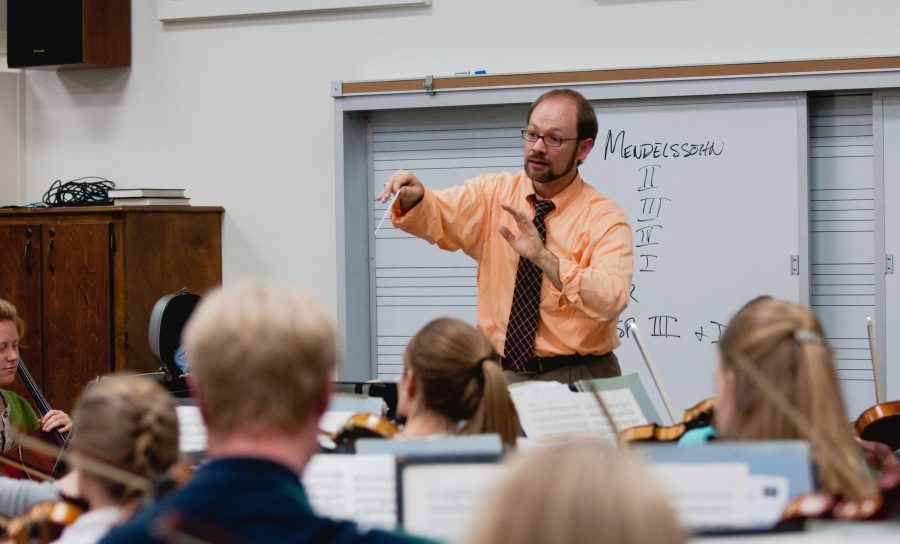The BJU Symphony Orchestra, under the direction of Dr. Michael Moore, will be giving its first concert of the semester tonight at 7 in Rodeheaver Auditorium.
Each of the three pieces being performed represents a different part of the world and accurately portrays the theme: souvenirs from world travel.
Dr. Michael Moore, head of the music education department, is replacing Miss R. Christine Lee this year as the director of the orchestra while she pursues her doctorate at the University of South Carolina.
Dr. Moore has been conducting various instrumental ensembles for many years and teaching at BJU for eight years.
Some orchestra members, like Catherine Wiles, a violinist and senior string pedagogy major, have known Dr. Moore for several years already and are eager to work with him this semester.
“He demands technical skill and precision but encourages us to play with heart,” Catherine said. “It’s easy to just play the notes, but he isn’t satisfied with that.”
One of Dr. Moore’s goals for this semester is to expand the horizons of the orchestra members. Hence, the theme of world travel is fitting not only for the enjoyment of the audience, but also for the education of the performers.
“My overarching goal for the orchestra is that they would develop as image bearers,” said Dr. Moore. “Our capacity to make and enjoy music is part of the image of God.”
The orchestra will be performing three pieces. “Each [piece] is distinctly associated with a place or country,” said Klayton Hoefler, a cellist and senior music education major. “It’s like we’re traveling to them.”
The first piece, The British Empire March by Edward Elgar, celebrates the expanse and power of the British Empire. At the time that the piece was written, the British Empire practically circled the globe.
The second piece, and likely the most unfamiliar to the audience, is Brazilian Impressions by Ottorino Respighi. “[It’s] a vigorous and fun piece,” Dr. Moore said. “You can almost feel the tropical breezes on your cheek.” The musicians will play two of three movements, both of which are considered to be unique folk dances.
The third and final piece is likely the one the audience will be most familiar with—Mendelssohn’s Italian Symphony. This is a childhood favorite for both Dr. Moore and Catherine.
“The piece is tough because it takes a lot of work to play, but it suits [Dr. Moore] well and he is able to communicate it really well,” Klayton said. A joyous and sunny piece, the symphony is based on Mendelssohn’s experiences and travels in Italy.
This concert has given the orchestra members and their new director a chance to grow their musical repertoire and increase their skill level, as well as to cultivate their relationships with each other.
“There is nothing like making music together,” Dr. Moore said. “It gives you the chance to create personal relationships and connect with other people in a unique way.”





















































